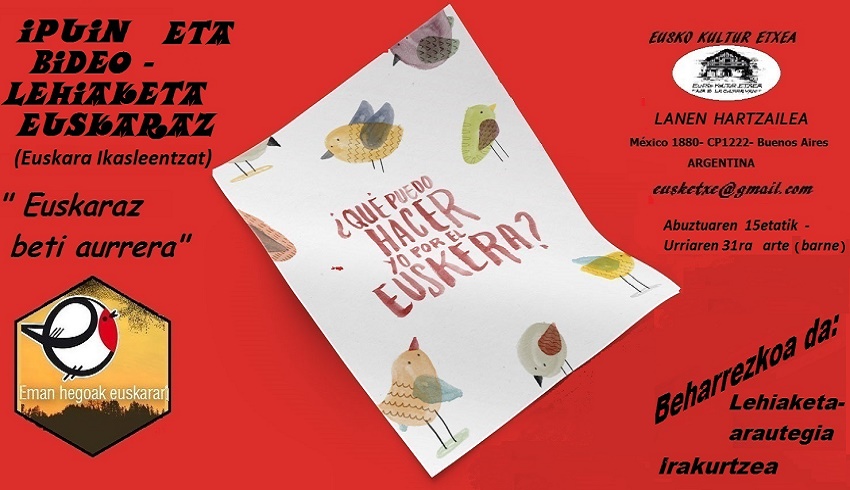Buenos Aires, Argentina. Yesterday afternoon the president of the Eusko Kultur Etxea-Eusketxe, Maria Elena Etcheverry, announced the winners of the “Euskaraz beti Aurrera,” contest organized by the institution to celebrate International Day of Euskera 2017.
According to the jury comprised of Jon Urdangarin from Maizpide; Gabriel Arce from Eusketxe and Marian Paglialunga, representative of the Argntinan Euskaraz Project, the winning authors and submissions were the following:
STORY CONTEST:
Beginning, First prize: ‘Iñakiak’ by Pablo Sergio Calabrese, Aberri Etxea in Viedma-Patagones
Beginning, Second prize: ‘Gure Txokoa’ by María del Rosario Barberena, Gure Txokoa in Azul
Advanced, First prize: the jury declared this empty
Advanced, Second prize: ‘Argentovask-Papelonera familia’ de Domitila Noemí Palma Galdon, Aberri Etxea in Viedma-Patagones
VIDEO CONTEST:
Beginning, First prize: ‘Umeen Bideoa’ (Children’s video). Irakasles: Rocío Basterra and Lucia Beroqui, Aberri Etxea in Viedma-Patagones
Beginning, Second prize: ‘Pablo eta Ana’ (Pablo and Ana). Irakasle: Rocío Basterra. Ikasles: Analia Vassolo Etcheto, Pablo Calabrese and Imanol Basterra, Aberri Etxea in Viedma-Patagones
Advanced, First prize: ‘Mati izeba eta Lauti’ (Aunt Mati and Lauti). Irakasle: Rocío Basterra. Ikasles: Matias Jaureguy, Abachin Basterra, Lautaro Castro, Federico Navarret and Imanol Basterra, Aberri Etxea in Viedma-Patagones
Advanced, Second prize: ‘Euskararen Hegoak’ (Euskera’s Wings). Irakasle: Beatriz Etchegaray. Ikasles: Marta Azcarate, Walter Belloso, Elisabet Berrojalbiz, María del Carmen Elzaurdia, Raúl Goicoechea, Diana Pérez Ibargoyen and Marisa Santa Cruz Oliden, Aberri Etxea in Viedma-Patagones
The winning works, both texts and videos will be published soon on the Eusketxe’s blog.
María Elena Etcheverry was very happy with how the contest went. “We are very happy and we would like to congratulate all the participants and winners. At the same time, I confess that we were hoping for more participation from Basque students. But we also understand that it isn’t easy to write and that, for example, in Buenos Aires, the rhythm of life makes it difficult participating in these things, even if they want to. But we will not give up and will continue to organize these kinds of activities since it is always good to have creative possibilities to use Basque,” Etcheverry concluded.






 Send to a friend
Send to a friend Add comment
Add comment








